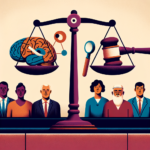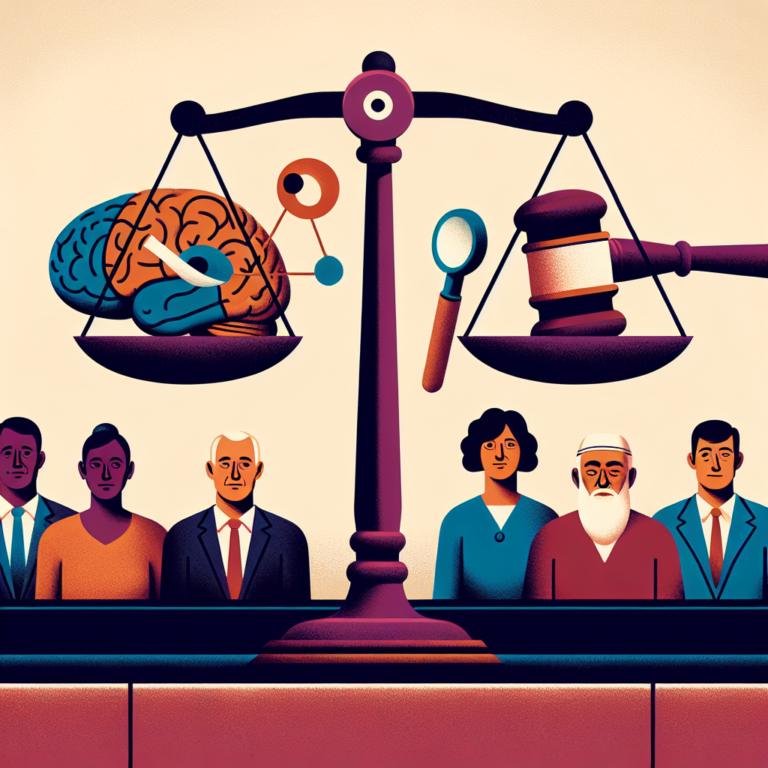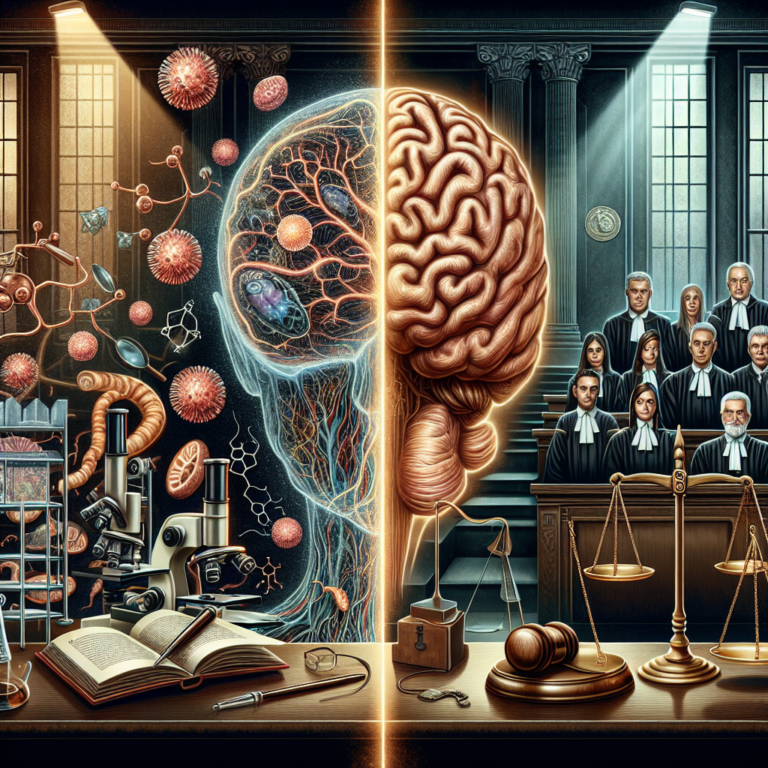
Introduction
In the fascinating and often contentious realm of criminal law, few topics stir as much debate as the insanity defense. The notion that a person can be exonerated of responsibility for a crime due to mental illness raises critical questions about justice, morality, and the very nature of sanity itself. At the heart of these cases lies an intricate, sometimes opaque process: psychological evaluations. These assessments, conducted behind closed doors, determine the outcomes of many trials, impacting lives, families, and communities.
This article will delve into the essential aspects of Behind Closed Doors: The Psychological Evaluations in Insanity Defense Cases, exploring their implications, methodologies, and the stunning real-world cases that highlight their importance. As we go deeper, we’ll uncover the complexities involved and offer insights that not only inform but also inspire further discussion on this pressing issue.
Understanding the Insanity Defense
The Legal Framework
The insanity defense varies by jurisdiction, but generally, it allows defendants to argue that due to a severe mental disorder, they lacked the ability to understand the wrongfulness of their actions at the time of the crime. This defense plays a crucial role in ensuring that justice accounts for mental health issues, thus recognizing that not all actions are a reflection of one’s moral culpability.
Key Points:
M’Naghten Rule: One of the most prevalent standards, it states that a defendant may plead insanity if, at the time of the crime, they were unable to understand the nature of their actions or that their actions were wrong due to a mental disorder.
- Durham Rule: In some jurisdictions, this broader approach allows for a defendant’s behavior to be linked to their mental illness even if they are not legally insane.
Misconceptions and Challenges
One of the most significant misconceptions surrounding the insanity defense is that it is frequently used or easily accepted. In reality, the process is complex, and successful claims are rare. Approximately 1% of all criminal cases utilize this defense, with an even smaller percentage resulting in a not guilty by reason of insanity verdict.
Understanding these nuances is essential as we explore Behind Closed Doors: The Psychological Evaluations in Insanity Defense Cases.
The Role of Psychological Evaluations
What Are Psychological Evaluations?
Psychological evaluations in the context of insanity defenses serve to assess a defendant’s mental state at the time of the crime. These evaluations can include clinical interviews, psychological testing, and review of historical records. They aim to provide a comprehensive view of an individual’s mental health, which is pivotal in understanding whether they meet the criteria for insanity.
Key Components of Psychological Evaluations
Clinical Interviews: A mental health professional conducts one-on-one interviews to gather a detailed history of the defendant, their mental health symptoms, and previous interventions.
Psychological Testing: Structured assessments may be employed to measure cognitive function, emotional states, and personality traits that can illuminate the individual’s mental state.
- Collateral Information: This includes records from previous treatments, police reports, and testimonies from family and friends.
The Evaluation Process
The evaluation process is not a straightforward task; it requires a delicate balance of scientific objective assessment and subjective interpretation. Understanding Behind Closed Doors: The Psychological Evaluations in Insanity Defense Cases necessitates awareness of the multiple factors influencing an evaluator’s conclusions.
Table 1: Common Psychological Tests in Insanity Defense Evaluations
| Test | Purpose |
|---|---|
| Minnesota Multiphasic Personality Inventory (MMPI) | Assesses personality traits and psychopathology |
| Structured Clinical Interview for DSM Disorders (SCID) | Gathers detailed psychiatric history for diagnosis |
| Rorschach Inkblot Test | Explores thought processes and emotional functioning |
| Thematic Apperception Test | Assesses underlying motives, concerns, and emotions |
The Evaluator’s Perspective
Psychologists and psychiatrists conducting these evaluations are tasked with more than just assessment; they serve as the bridge between the legal system and mental health understanding. Their opinions can sway juries and judges and, thus, have profound consequences. This underscores the importance of rigorous training and ethical adherence in their work.
Real-World Applications: Notable Case Studies
Case Study 1: John Hinckley Jr.
In the attempt on President Ronald Reagan’s life in 1981, John Hinckley Jr. invoked the insanity defense, claiming he was motivated by an obsession with the film "Taxi Driver." His psychological evaluations revealed significant mental illness, including delusions. Hinckley’s acquittal led to public outrage and re-examination of the insanity defense, demonstrating the impact of Behind Closed Doors: The Psychological Evaluations in Insanity Defense Cases.
Analysis
This case highlights the power of psychological evaluations in amplifying societal concerns about the insanity defense. It led to reforms in laws governing such defenses across the United States.
Case Study 2: Andrea Yates
In 2001, Andrea Yates drowned her five children in a bathtub, claiming she was influenced by severe postpartum psychosis. During her trial, psychological evaluations painted a bleak picture of her mental state. Initially convicted, Yates was later found not guilty by reason of insanity after her psychological condition was more thoroughly examined.
Analysis
Yates’ case demonstrates the evolution of mental health awareness within the judicial process and emphasizes the critical role that Behind Closed Doors: The Psychological Evaluations in Insanity Defense Cases play in shaping such narratives.
Case Study 3: Eric Harris and Dylan Klebold
The perpetrators of the Columbine High School tragedy, Eric Harris and Dylan Klebold, underwent psychological evaluations both before and after the event. Though they did not use an insanity defense, their evaluations raised questions about pre-existing mental conditions and the role of psychological assessments in understanding violent behaviors.
Analysis
This case serves as a cautionary tale, exploring the complexities of mental health evaluations in the context of preemptive measures and social responsibility.
The Ethical Considerations
Stigma and Misinterpretation
The stigma surrounding mental illness can affect not only the perceptions of juries and judges but also the evaluations themselves. Evaluators must navigate these biases to provide fair assessments. Ethical evaluation requires cultural competence and awareness of socio-economic factors that influence mental health.
The Role of the Media
The portrayal of insanity defenses in the media can distort public understanding of mental illness, affecting outcomes in future cases. Accuracy in reporting and representation of psychological evaluations is crucial in shaping public perception.
Conclusion
The intricacies of Behind Closed Doors: The Psychological Evaluations in Insanity Defense Cases reveal a complex interplay between mental health, law, and ethics. These evaluations are not merely clinical assessments; they are pivotal components that can alter the trajectory of a life, a family, and the community.
As we continue to refine our understanding of mental health in the context of legal defenses, it’s important to engage in open conversations about these issues. Advocacy for mental health awareness, reform, and education can lead to better outcomes for all involved. The journey ahead will require continued commitment to empathy, understanding, and a rethink of how we perceive and address mental illness within our judicial frameworks.
Frequently Asked Questions (FAQs)
1. What qualifies as insanity in legal terms?
The legal definition of insanity varies but generally centers around whether a defendant could comprehend the nature or wrongdoing of their actions due to a severe mental disorder.
2. How often is the insanity defense successfully used?
The insanity defense is infrequently used and rarely successful, accounting for about 1% of criminal cases in the U.S.
3. Do psychological evaluations always lead to a clear understanding of a defendant’s mental state?
No, psychological evaluations can vary greatly. Subjective factors, biases, and the evaluator’s experience can all influence outcomes.
4. What happens if a defendant is found not guilty by reason of insanity?
They typically receive treatment in a mental health facility rather than serving time in prison, with their release conditions determined by mental health professionals.
5. How can society better understand the insanity defense?
By promoting mental health education and awareness, encouraging conversations that destigmatize mental illness, and considering the complexities of psychological evaluations within the legal system.
As we close the door on this exploration of psychological evaluations in insanity defense cases, it’s crucial to keep the conversation going. Whether through advocacy, education, or simple awareness, understanding the mental health complexities involved has the power to foster a more just system.















